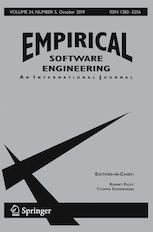Empirical Software Engineering - An International Journal
Editor-in-Chief: Robert Feldt; Thomas Zimmermann
ISSN: 1382-3256 (print version)
ISSN: 1573-7616 (electronic version)
Journal no. 10664
Facebook: facebook.com/emsejournal
Twitter: @emsejournal

Call for Papers — EMSE Special Issue on “Cooperative and Human Aspects of Software Engineering (CHASE)”
A special issue of the Empirical Software Engineering Journal.
Editors of the Special Issue
- Fabio Calefato, University of Bari, Italy – fabio.calefato@uniba.it
- Hourieh Khalajzadeh, Deakin University, Australia – hkhalajzadeh@deakin.edu.au
- Igor Steinmacher, Northern Arizona University, USA – igor.steinmacher@nau.edu
Submissions
This special issue in the Empirical Software Engineering journal is intended to provide practitioners and researchers a venue to present their research related to the cooperative and human aspects of software engineering. This special issue seeks new submissions as well as extended versions of the 16th International Conference on Cooperative and Human Aspects of Software Engineering (CHASE 2023) select papers and Registered Reports (RR). Submitted papers must have a strong empirical basis/component to be eligible for this special issue. The Empirical Software Engineering Journal (https://www.springer.com/journal/10664) provides a forum for applied software engineering research with a strong empirical component and a venue for publishing empirical results relevant to both researchers and practitioners.
New submissions: we welcome submissions reporting on original studies focusing on the human aspects of software engineering. We refer to the CHASE 2023 CFP (https://conf.researchr.org/track/chase-2023/chase-2023-research-track) for further information on the scope and expectations.
Extended research papers: authors of select CHASE 2023 research papers are invited to submit an extended version of their work. To comply with the goals of a journal publication, we are asking to revise and substantially extend original CHASE papers. We are seeking conceptual extensions in terms of new contributions and not the same content with more words or page count. Examples of possible extensions can be adding additional practical applications determined through case studies or experiments, additional empirical validation, systematic comparisons with other approaches, etc. Revised papers should explicitly explain how they extend the original CHASE paper. For extended CHASE papers, we strongly recommend authors submit after having received and carefully considered the CHASE 2023 reviews.
Registered reports: registered reports that have passed Stage 1 at CHASE 2023 (https://conf.researchr.org/track/chase-2023/chase-2023-rr), and conducted the study and actual data collection and analysis, can submit their final results to this special issue.
This Special Issue welcomes any submissions that adhere to topics related to Cooperative and Human Aspects of Software Engineering. All submissions will be reviewed using the Empirical Software Engineering Journal standards and will undergo a rigorous reviewing process. Reviews of extended papers may include some of the reviewers of the CHASE 2023 paper as well as some new reviewers.
Schedule
Submission Deadline: 15 December 2023 30 December 2023 (New deadline)
Papers can be submitted at any time, but no later than 30 December 2023. The review process for papers will start the revision procedure as soon as submitted. There is no limit on the number of accepted papers, decisions about papers are made independently of other papers. Accepted papers will be published online first and in the next issue.
The papers of the special issue will be published over several EMSE issues and collected in a topical collection. There may be as many revision rounds as needed for individual submissions, as Empirical Software Engineering Journal values the quality of published papers over committing to special issue publication deadlines. However, decisions for each submission will be made independently and papers will be published as online first articles and in the next issue as they are accepted for timely communication of research results.
Submission Instructions
Papers should be submitted through the Empirical Software Engineering editorial manager website (http://www.editorialmanager.com/emse) as follows (1) select “Research Papers” and (2) later on the Additional Information page:
- Answer “Yes” to “Does this paper belong to a special issue?”
- And select “CHASE” for “Please select the issue your manuscript belongs to”.
For formatting guidelines as well as submission instructions, visit https://www.springer.com/journal/10664/submission-guidelines